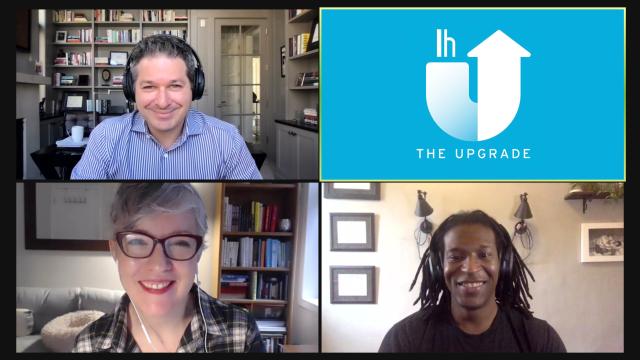Do you ever find yourself in an anxiety spiral, ruminating over things that stress you out? Have you ever replayed that embarrassing interaction or fight with your partner over and over?
If you’ve ever struggled with any of these things, you’ll appreciate that this week we’re learning how to better control that voice in our heads with help from psychologist Ethan Kross. Listen to this week’s Upgrade episode to hear why venting to a trusted friend isn’t always the most helpful way to deal, and how we can use language and other distancing tools to help us gain a better perspective on our problems.
Ethan is a professor at the University of Michigan’s Psychology Department and Ross School of Business, and is one of the world’s leading experts on controlling the conscious mind. His book is called Chatter: The Voice in Our Head, Why It Matters, and How to Harness It.
Listen to The Upgrade above or find us in all the usual places podcasts are served, including Apple Podcasts, Google Play, Spotify and iHeartRadio.
Highlights from this week’s episode
From the Ethan Kross interview:
On what chatter is, and why it’s a problem:
I think the first thing to clarify is chatter is not just negative self-talk. When I talk to people about this topic, a lot of people say, “Well, how do I stop being negative with myself?” The ability to be critical in certain moments is really useful. Like if I flub an interview or presentation, it’s good for me to be able to say “Oop! You messed that up. Here’s what went wrong.” What chatter is, is when we get stuck in a loop. So I messed up: “Oh, my God, what am I going to do? What if this happens?” And then that and the next thing you know, you’re fired or have cancer, right? So you’re getting stuck on this hamster wheel. We’re taking something negative, you’re zooming in really narrowly on just the negativity of it.
On how temporal distancing can help alleviate chatter:
[R]ight before we logged on, I had two kids who had systematically dismantled their mother’s closet in an attempt to find something green to wear for St. Patrick’s Day, screaming everywhere. “I’m on a podcast!” Like, you know, so what can I do? I could think, “Well, four months from now I’m going to be vaccinated. I’m to be back at work and, you know, not having all this tumult at home…” What that does, that transporting myself into the future, that’s distancing. It makes me realise [the] big picture. What I’m going through right now is awful. But guess what? It’s temporary. It will end. That gives me hope. And hope is a balm for chatter.
On how talking to ourselves in the third person can help us work through our rumination:
What we’ve learned is that language can be a distancing tool. We typically use names when we think about refer to other people and what we’ve learned to do — it’s like a linguistic hack or a psychological jujitsu move — when we use our own name to think about ourselves, that changes our perspective. It gets us to relate to ourselves like we’re talking to someone else and that gives us distance and that can be productive, too.
To hear more great tips on how to quell that worrying, self-criticising inner voice, we highly recommend listening to the full episode.
Episode Transcript

Leave a Reply
You must be logged in to post a comment.